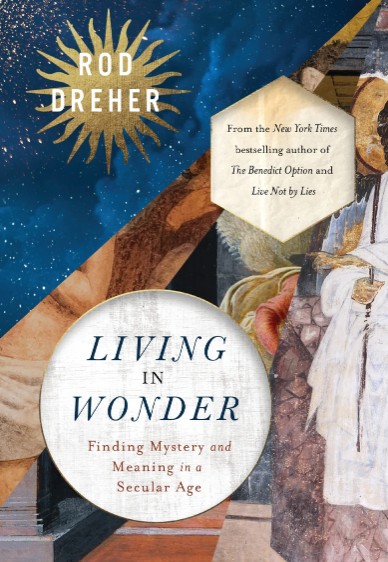Rod Dreher, Living in Wonder: Finding Mystery and Meaning in a Secular Age (Grand Rapids, Michigan: Zondervan, 2024).
Dreher gives a list of what this re-enchantment means, drawn from Joshua Landry and Michael Saler in 2009, which includes order, mystery, meaning, miracles, sacred spaces, and redemption, among other things (13). [In other words, it means life is more like a good story than it is like “life” as we’ve heretofore understood it.]
Dreher locates the origin of nominalism in the scholastic separation of nature from supernature. [I’m not sure how that follows as some sort of corruption though because previously he himself said holy water is just grace-charged water being fully itself. (11).] The nominalists took this in a radical direction by saying meaning and purpose were not intrinsic to matter but only imposed by God, arbitrarily. This sealed off the world from true meaning and set up the birth of science, which was to cut and dissect this meaningless void around us (28-9). [I theorize that modernity is a demon of reductionistic rationalism. He is served by our rebellion against the created order and he teaches the secrets of dead matter in return for obeisance. His ugly growths then sprout up across our cities as those temples of modernism, modern architecture.]
The Reformation drew the natural-supernatural line in such a way as to place Catholic ritual and piety on the side of magic, and denied virtue and supernatural power as linked (from Eire, They Flew) (30).
Dreher highlights the phenomenon of conservative orthodox Christians who profess belief in the supernatural living as if these things did not exist or impinge on daily life (31).
Descartes wasn’t trying to shred Christian understanding of the universe, but his mind body dualism and rationalism (in reaction to the nominalists) was the first step (32). Newton took the next step by giving a model of the universe that made possible the “watchmaker God”: a universe disconnected from the supernatural that ran on its own principles (32).
Capitalism replaced enchanted traditional religion. Blank skyscrapers replaced church spires, and rather than intrinsic spiritual value to the world, it all gets replaced with extrinsic transaction values (33-35).
Kingsnorth: we live with the Machine: the “choosing individual” is its subject. The past is evil and all that matters is the future. This is modernistic capitalism (39).
Ian McGilchrist has the thesis that we have been operating on left-brain logic since the dawn of modernity (44). [His view could be called a metamodern neuroscience.]
Exorcist: “You can’t force God to talk to you from the tabernacle, because he’s sovereign. But you can force the fallen ones to talk to you—and they will” (107).
Charles Taylor in A Secular Age says the Reformation was “an engine of disenchantment” because it drained spirituality from the cosmos and relegated it only to the Holy Spirit [or the realm of mind] (120). It furthered the solidification of the “buffered self” (119).
“Liquid modernity” emerged after the French Revolution, and the model for reality became technology, since change became the only constant: massive upheavals and reorganizations around productive capabilities (120).
“Metaphysic of technique” responsible for shredding everything standing in the way of greater efficiency and less friction. That includes family, rootedness, traditions, etc. (121).
